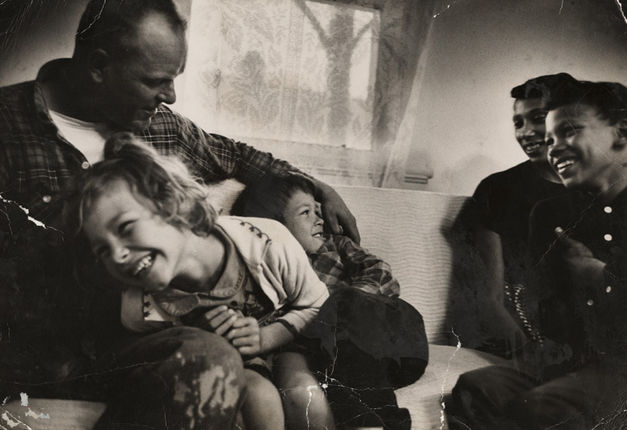45 years ago, interracial marriage was a crime. It wasn’t until the Supreme Court overturned the miscegnation laws in Loving vs. Virginia (1967). The plaintiffs were Richard Perry Loving, a white man, and his wife, Mildred Loving, a woman of African American and Native American descent, who had been arrested for miscegenation nine years earlier in Virginia. I’ve noted Loving Day (June 12th) for a few years now, and remember reading Mildred Loving’s obituary in the New York Times.
This year, there is both a photography exhibit and documentary film examining the couple behind this case.
The Loving Story
The Loving Story, a documentary film, tells the story of Richard and Mildred Loving to examine the drama, the history, and the current state of interracial marriage and tolerance in the United States. The documentary was filmed in High Definition video and 16mm film. It is intended for a wide audience through theatrical release, festival screenings, community screenings, national television broadcast, web-based broadcast, and DVD and educational distribution. The film has enjoyed sold-out screenings at festivals and special events since its World Premiere at the Full Frame Documentary Film Festival in April 2011.t’ll be shown on Valentine’s Day, February 14th on HBO.The Loving Story is an Augusta Films Production. It was directed by Nancy Buirski, produced by Nancy Buirski and Elisabeth Haviland James, and edited by James. The documentary is fiscally sponsored by Living Archives, a 501 (c) (3) non-profit organization, created by legendary documentarian DA Pennebaker, and by the Southern Documentary Fund.

Grey Villet, [Richard and Mildred Loving with their children Peggy, Donald, and Sidney in their living room, King and Queen County, Virginia. Estate of Grey Villet
Forty-five years ago, sixteen states still prohibited interracial marriage. Then, in 1967, the U.S. Supreme Court considered the case of Richard Perry Loving, a white man, and his wife, Mildred Loving, a woman of African American and Native American descent, who had been arrested for miscegenation nine years earlier in Virginia. The Lovings were not active in the Civil Rights movement but their tenacious legal battle to justify their marriage changed history when the Supreme Court unanimously declared Virginia’s anti-miscegenation law—and all race-based marriage bans—unconstitutional. LIFE magazine photographer Grey Villet’s intimate images were uncovered by director Nancy Buirski during the making of The Loving Story, an HBO documentary debuting on February 14, 2012. The exhibition, organized by Assistant Curator of Collections Erin Barnett, includes some 20 vintage prints loaned by the estate of Grey Villet and by the Loving family. This exhibition was made possible with public funds from the New York City Department of Cultural Affairs in partnership with the City Council. This exhibit runs at the International Center of Photography January 20-May 6, 2012.
If you can’t get to the ICP exhibit, there’s Times has a beautiful slideshow of Grey Villet’s photography, ” The Case of Loving v. Bigotry.”






